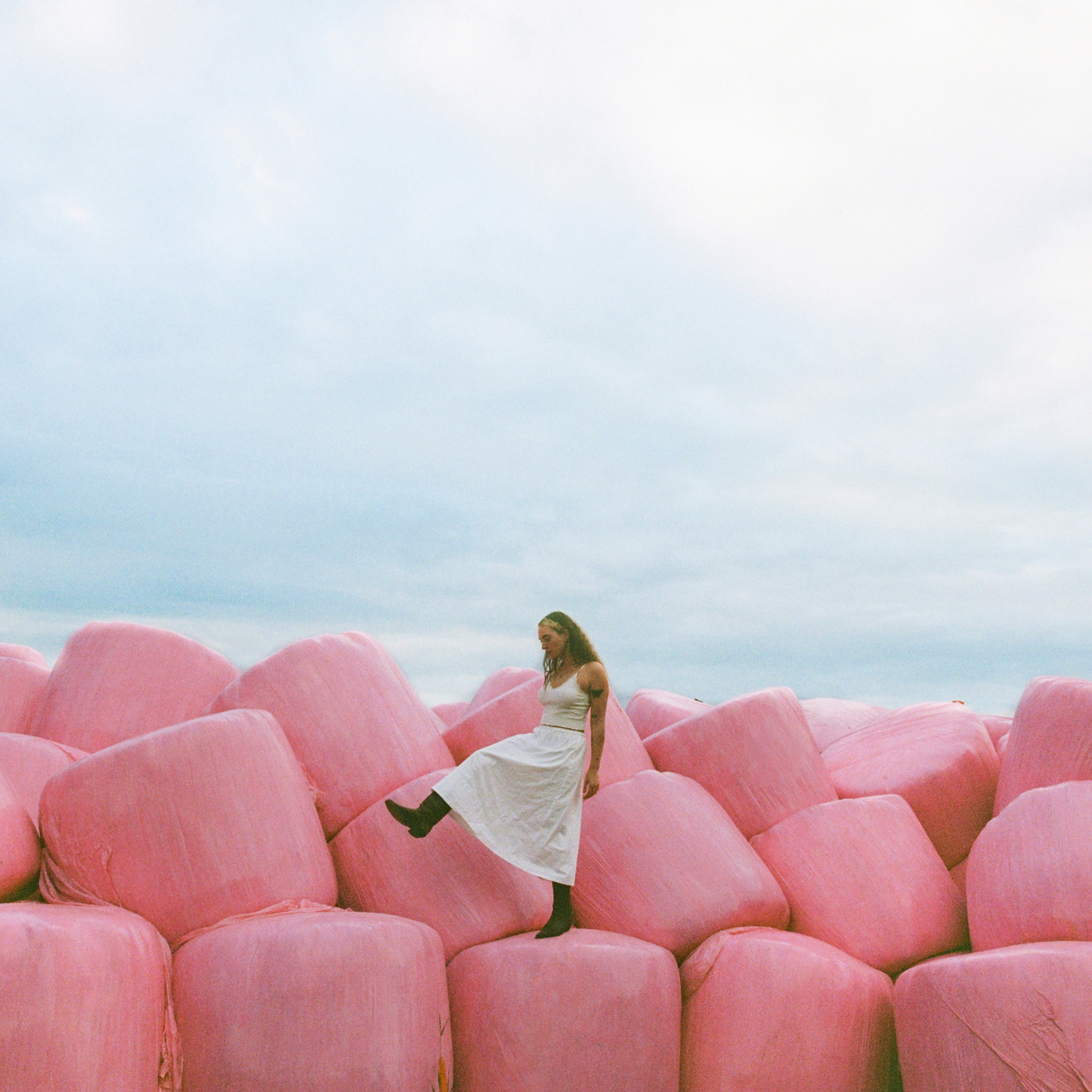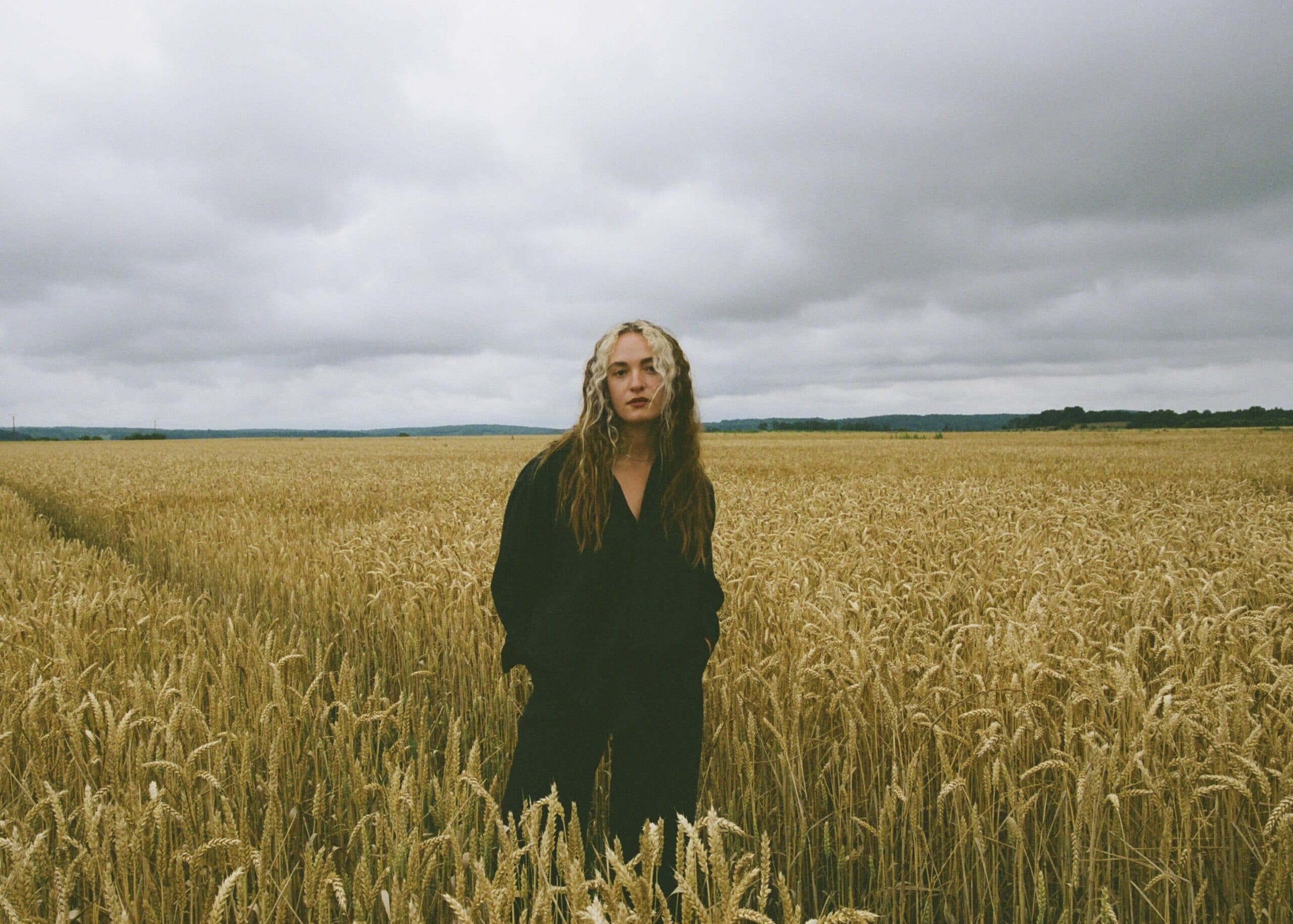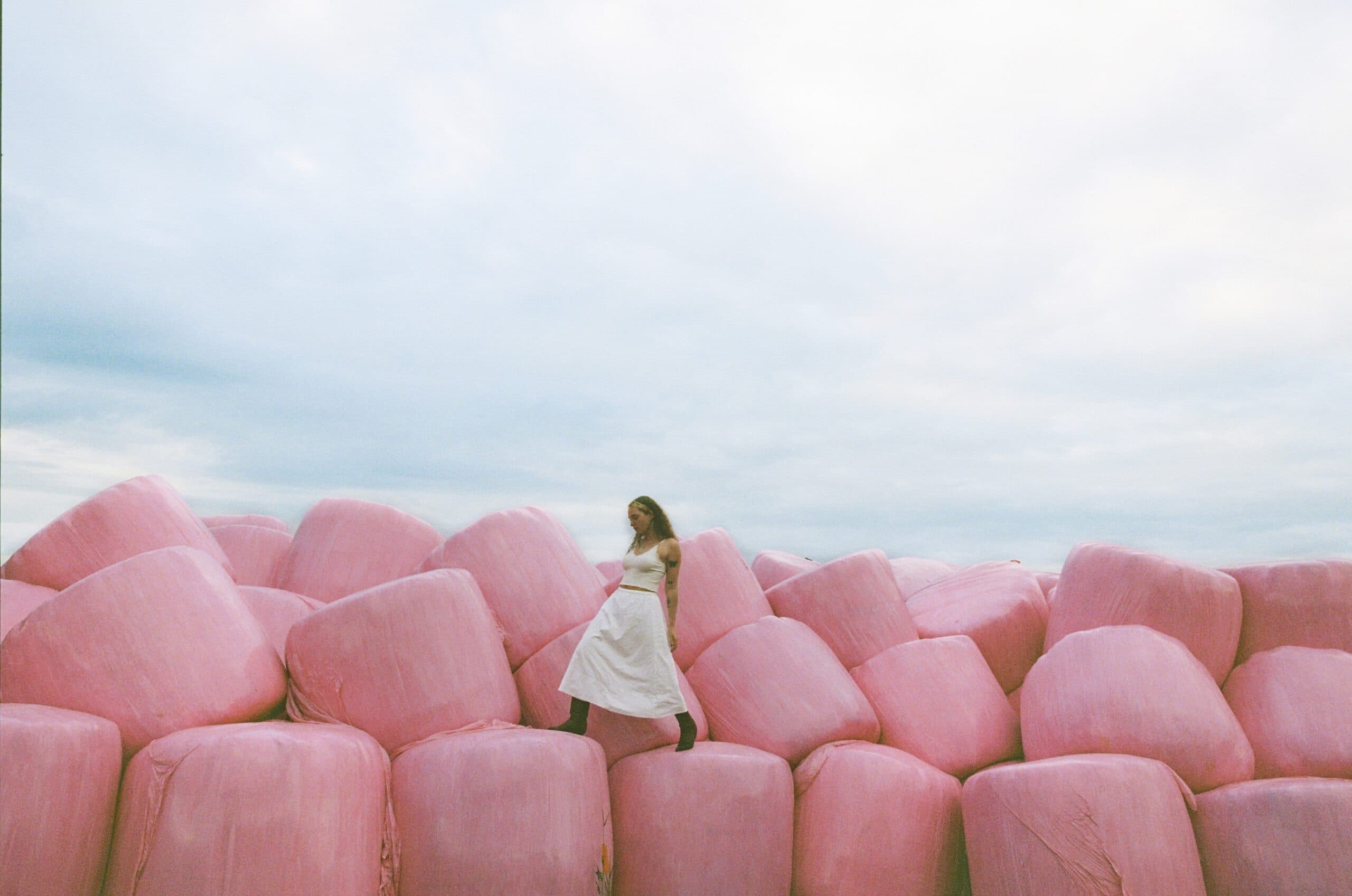Néomí: “Feeling things is what makes us human and that’s what art is about”

Néomí loves the night. She does her best songwriting once the sun has set, with a glass of whiskey and a cigarette (despite her best efforts to quit). The Dutch-Surinamese artist has built her sound around that after-dark mystique and her new EP, Another Day Will Pass, is no exception.
The six songs it contains are an atmospheric blend of folk and indie-pop, inspired by some of Néomí’s biggest musical influences: Joni Mitchell, Bon Iver and The Japanese House. The raw, confessional lyrics are offset by the EP’s imagery, which features Néomí hopping across a cheerful stack of pink hay bales. This EP is all about contrasts, she tells me. Her sound may have matured since she released her debut album somebody’s daughter in May 2024, yet her ethereal vocals remain front and centre.
When it comes to her lyrical approach, that is inextricably linked to the singer-songwriter’s geography. Néomí grew up in Zwijndrecht, an industrial town just outside of Rotterdam, where people say what they think and don’t sugarcoat it. That frankness has shaped her messaging and helped her develop an honest, authentic voice. And although her career has taken her across the globe – from France to London to Nashville, where she joins our Zoom call from – Rotterdam has always been home.

What inspired your new EP Another Year Will Pass?
It just happened — it flowed. It wasn’t one specific thing. I think that’s mostly how I write. It’s very intuitive. I just knew that I had to write again and then these songs came out. The theme of the EP is time, hence why it’s called Another Year Will Pass. I have been through a lot and was feeling a bit stuck with myself, but the only thing that I was certain of is that time is always passing. Whatever happens there will be another day.
Should the EP be listened to in order?
I’m a sucker for listening to things in order. I still love the old culture where you would buy vinyl and play it exactly how the artist wanted you to. My EP starts with “Do You Want to Be Honest” because it was quite a big song, and then “Another Year Will Pass” comes on. That was quite a heavy track, so it’s followed by the more uplifting song, “Sit Back Baby”. “It’s Never Easy (Leaving Someone Behind)” was written for a friend who was dealing with loss. And I really wanted to end with “Trigger” because that’s my answer to everything. “The Dog” is about depression and trying to deal with everything that’s happening in the world at the moment. Sometimes it feels so wrong to be shoved up my own ass, busy with my music and being an artist, while people are fucking dying across the globe. How can I be an artist while people need me? That’s something I’m struggling with every day.
How did you decide on a ‘look’ for the EP and curate the visual imagery that goes with the music?
I really wanted it to be as real and human as possible because the music is kind of sad. For example, “Trigger” is one of the most heartfelt songs that I have ever written, and it really hurts every time I sing it on stage because it’s super real. Normally my aesthetics are a bit darker, but for this EP, I was staying in France with some friends, and we just went outside and took photos and had fun. I found some hay bales that were so pink, and I was really impressed with how that looked. I also feel like the songs are so sad, they could do with a bit of colour and happiness. This whole EP is about that contrast: happy and sad, struggling but also being fine.

Is it ever difficult to write certain emotions into your music, and how do you navigate that?
I always write from emotion. Whatever I feel the most I write about and everything that moves me is a song. Sometimes it’s fucking sad and I’m crying while writing and it’s an annoying process because I think, I don’t want to feel sad. But unfortunately that’s where I get my inspiration from. And once I’ve written about it, I’m okay because that’s out of my system now. So, I’m not really navigating the emotion when I write songs — I’m just doing it and then hating it and then loving it again. Writing for me is quite a difficult process, but it’s the only thing I know.
When you perform those emotional songs is it quite a different experience to writing them?
When I perform, I’m sometimes reminded of a heavy time, but it’s also very empowering to know that it’s over and I can just share the stories with other people. It’s almost a healing process for me. Recently I played a show here in Nashville and so many people came up to me and said, “Trigger” is such a nice song and I can really relate to what you’ve said about it and it really made me cry. That’s why I think it’s important for writers and artists to share their life, because we’re all fucking human and we’re all the same. Feeling things is what makes us human and that’s what art is about.
What kind of music and artists have influenced you?
I listen to a lot of old stuff. Joni Mitchell is my queen. I love Joni Mitchell so much because the freedom of her writing is just insane and she never compromised on what she wanted to do. Bob Dylan was also a big influence because my dad played me that, and the Rolling Stones. If we’re talking more modern artists, I love The Japanese House, Bon Iver and Billie Marten — the more folky stuff. Then Holly Humberstone is my guilty pleasure. I love her songs, and I love her vibe and she’s just so cool.
What is your writing process?
It’s very simple. I just sit down, get my guitar out, and then there’s a song. I wish I could be super cool and say I always have a cocktail before I start, but I just feel like I need to write, and then I write, and then it’s finished. I don’t sit on songs — a good song is one that just comes out. It usually takes me half an hour or an hour to write, and then the long process of producing it starts. The writing itself is never a very long journey because I just have something to say, and I say it. I’m a sucker for whisky and I love a cigarette — while I write, I have a lot of cigarettes. It’s very bad, and I keep saying I should quit, but I haven’t found a way yet.
You taught yourself to play the guitar. Do you think that impacts the way you approach songwriting?
I did teach myself — that’s why I’m still very shitty. It’s so funny that you ask this because I’ve been in Nashville for two weeks now and the standard here is quite high. People see songwriting as a job, and I just can’t see that way. Sometimes I feel like that’s my weakness, but I also think it’s my strength. I’m not as good as someone who has studied guitar for four years on the concert tour and sometimes, I feel super insecure about that — like I’m not an artist at all because I don’t know what I’m doing. But I’m also trying to embrace it. I don’t know what I’m doing but I’m doing it anyway. And it’s not all about technique. It’s about feeling. I really preach for that in life. We’re just human beings and you can do anything and be anything you want if you put the energy into it.
Why do you choose to keep your music quite simple?
Just give me two chords and I’ll write a song. For me, the message is so important, and I think the simpler the song, the easier it is for the message to get into my heart (not to sound too philosophical about it). The simple things in life really hit me, too. For example, I love seeing an old couple walking through a park holding hands — that is everything to me; I’m like, I can die now. Or getting up in the morning and seeing a beautiful sunrise. I think that’s what you hear in my music — I just love simplicity.
- WriterEmily Warner
- Image Credits Liz van den Akker




